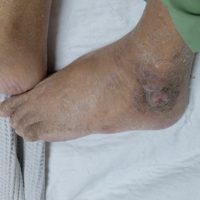Bedsores: The Hidden Killer In Nursing Homes

When our loved ones are in nursing homes, the biggest danger, and the thing that poses the most risk to our loved ones, is the thing that we actually cannot see, at least, not when our loved one is laying in bed, seemingly peacefully: Bedsores. What makes bedsores so dangerous is that someone doesn’t have to be actively abused to get bed sores—they just have to be ignored, or neglected in a nursing home.
How do Bed Sores Form?
Bedsores, which actually are decubitus ulcers, happen when the skin remains in contact with a surface, particularly an abrasive surface, for extended periods of time. This often happens to patients who are bedridden, as their tailbones are in constant contact with the linens underneath them.
Bedsores can happen to people in hospitals, but more often happen in nursing homes, because of the extended period of time that people remain in nursing homes.
Because many nursing home residents may be unable to move on their own, or may be very weak, they often are unable to move themselves or shift their bodies the way that we normally can do. That can lead to bedsores forming.
How Dangerous Are They?
Bedsores are classified in stages. At the first stage, there is some redness, and perhaps some breakdown of tissue, but the patient is not at a stage where his or her life is in jeopardy, if the condition is recognized and tended to immediately. But over time, if the condition persists, and the patient is not attended to, the skin as well as the tissue and muscle underneath, can completely break down, exposing even bone to the outside world.
This can have serious consequences. Aside from the obvious pain of having a deep, gaping open wound, and the obvious consequences of losing muscle and tissue, is the introduction of deadly infection into the body. The sore is often open, and moist, and underneath the patient, creating a perfect breeding ground for infection.
The Hidden Risk
Many people who visit loved ones in a nursing home, will never spot a decubitus ulcer. It is underneath the patient, and not visible when you just look at someone sleeping seemingly peacefully in place. If the patient is not able to vocalize, that will make it even harder to see that anything is wrong.
Avoiding Bed Sores
Sadly, for as deadly as bed sores can be, they are highly preventable—all that has to be done is to move the patient at routine intervals. In fact, many nursing homes and hospitals even have beds that shift the patient automatically. But in homes that don’t have these kinds of beds, it’s up to staff to be attentive–something that often doesn’t happen in understaffed or poorly trained nursing homes.
Contact our Rhode Island personal injury lawyers at Robert E. Craven & Associates at 401-453-2700 today for a free consultation if someone you love has been injured in a nursing home.
Sources:
webmd.com/skin-problems-and-treatments/pressure-sores-4-stages
mayoclinic.org/diseases-conditions/bed-sores/symptoms-causes/syc-20355893

